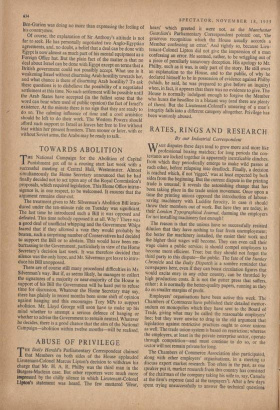TOWARDS ABOLITION
THE National Campaign for the Abolition of Capital Punishment got off to a rousing start last week with a successful meeting at Central Hall. Westminster. Almost simultaneously the Home Secretary announced that he had finally decided not to act upon any of the Royal Commission's proposals, which required legislation. This Home Office intran- sigence is, in one respect, to be welcomed. It ensures that the argument remains clear-cut.
The treatment given to Mr. Silverman's Abolition Bill intro- duced under the ten-minute rule on Tuesday was significant. The last time he introduced such a Bill it was opposed and defeated. This time nobody opposed it at all. Why? There was a good deal of unofficial whipping and the Government Whips feared that if they allowed a vote they would probably be beaten, such a surprising number of Conservatives had decided to support the Bill or to abstain. This would have been em- barrassing to the Government, particularly in view of the Home Secretary's decision last week. It was therefore decided that silence was the only hope, and Mr. Silverman got leave to intro- duce his Bill unopposed.
There are of course still many procedural difficulties in Mr. Silverman's way. But if, as seems likely, he manages to collect the signatures of a majority or near-majority of the House in support of his Bill the Government will be hard put to refuse time for discussion. Whatever the Home Secretary may say, there has plainly in recent months been some shift of opinion against hanging and this encourages Tory MPs to support abolition. Mr. Lloyd George will soon have to make up his mind whether to attempt a serious defence of hanging or whether to advise the Government to remain neutral. Whatever he decides, there is a good chance that the aim of the National Campaign—abolition within twelve months—will be realised.










































































 Previous page
Previous page